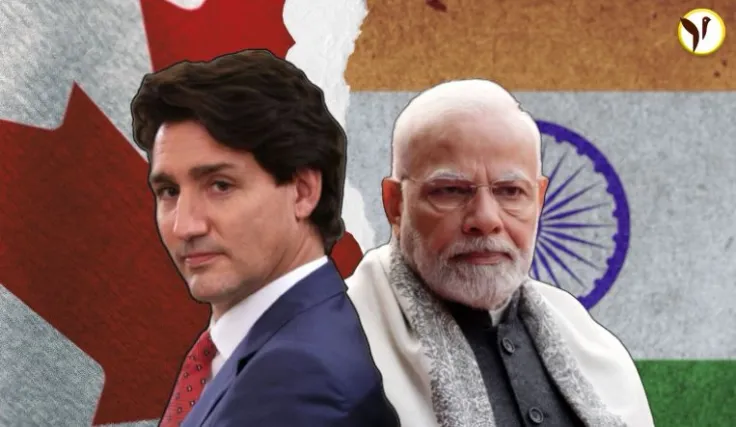Over the years, Canada has been the first choice of the majority of Indians when it comes to pursuing higher education or looking for job opportunities. The reason behind this is the benefits provided by Canada to immigrants like Provincial Nominee Programs (PNPs), Family Sponsorship, etc. If we talk about the numbers, then the 2021 census says that 2.1 percent of the total Indian population stays in Canada. But the very recent rifts between Canada and India have arisen after Canadian Prime Minister Justin Trudeau alleged India for the death of Sikh Independence advocate Hardeep Singh Nijjar. Following this India has suspended Visa Services for Canada in order to protect its dignity.
Why does Canada attract Indian Immigrants so much?
It has been found through research that India has been the major source of immigrants for Canada since 2018. But why? The answer is the various immigrant benefits provided by Canada which make the life of immigrants easier in some way. Among all the benefits a majority of them are listed below.
1. Education: Canada's top-tier educational institutions attract Indian students seeking better job prospects and a brighter future due to its high-quality education.
2. Job Opportunities: Canada's stable economy offers diverse job opportunities, particularly appealing to Indians seeking high-paying positions and successful career establishments in Canada.
3. Quality of Life: Canada is a top-tier global destination, attracting Indians due to its peaceful, secure environment, excellent healthcare, and social security.
4. Immigration Policies: Canada's welcoming immigration policy facilitates Indian migration, offering various programs and pathways for skilled workers, students, and families to settle permanently in the country.
The current diplomatic Strain and Accusations
India and Canada's strategic partnership is facing challenges due to the murder of Sikh separatist leader Hardeep Singh Nijjar in British Columbia. Canadian Prime Minister Justin Trudeau accuses Indian government agents of involvement in a murder, causing India to deny the allegations and expel diplomats, jeopardizing diplomatic cooperation.
The Khalistan issue, a demand for a separate Sikh homeland, is a source of conflict among Sikh immigrant communities in Canada, the UK, and Australia. The recent deaths of pro-Khalistan activists in various countries have increased tensions.
The relationship between India and Canada has hit a snag, raising concerns about the potential consequences for their strategic partnership in both security and trade.
While the West is concerned about the increase, experts believe that India's efforts to strengthen ties with like-minded countries to counter China's influence will be unaffected. It does, however, present a strategic challenge for Western governments seeking to balance their relations with India and Canada.
The future of this relationship is uncertain in the short term, but long-term ties may weather the storm through dialogue and diplomacy rather than confrontation. Finding common ground and addressing underlying issues will be crucial in repairing these strained diplomatic ties.
Meanwhile, Canadian MP Chandra Arya, an Indo-Canadian leader and member of the Liberal Party of Canada, the same party as Trudeau, claimed that some extremist elements are "attacking" and "threatening" Hindu Canadians to return to India. He also urged all Hindu-Canadians in the country to remain calm and vigilant and to report any suspicious activity to law enforcement agencies.
Diplomatic Tensions between Canada and India: Implications for the Future
The recent rise of diplomatic tensions between Canada and India is concerning for Indian entrepreneurs.
Because of the current situation, Canada's Start-up Visa Program, which is appealing to Indian startups, faces uncertainties.
Visa Ban and Its Implications
The impact of the visa ban on trade, business, and startups using Canada as a gateway to North America concerns Indian entrepreneurs.
Some Indian firms may shift their focus directly to the US market, taking advantage of the strong Indo-US relationship.
Exploring Alternative Destinations
Due to changing circumstances, Indian startups may consider alternative approaching destinations within the United States, such as Mexico or Latin American countries.
Uncertainty Surrounding Canada's PR Program
Canada's Permanent Residency (PR) program, which was once an option for H1B visa holders, is now in doubt. H1B visa holders in the United States may consider returning to India if their H1B extensions are denied.
CUSMA and Startup Expansion
The Canada-United States-Mexico Trade Agreement (CUSMA) has promoted cross-border trade by lowering trade barriers and expanding market access.
Canadian entry has facilitated startup expansion into the financially rewarding US market.
The Effect on Education and International Relations
Recent events that have strained Indo-Canadian ties may have ramifications in a variety of sectors, including education.
India's significant contribution to Canada's international student community may be jeopardized, potentially jeopardizing bilateral relations.
Investigating Alternative Business Locations
In response to the crisis, Indian entrepreneurs are considering alternative business locations such as Gift City, Dubai, or Delaware.
In the middle of ongoing uncertainty, these locations are seeking security and policy stability.
The Importance of De-escalation
De-escalation, according to experts, is the preferred solution for both countries. Recognizing the importance of India's thriving startup ecosystem and the role of Canada as a source of capital
Potential Decrease in Indian Student Enrollment
Bhaskar Majumdar predicts a possible slowdown in the number of Indian students choosing Canada for their education.
Australia and the United Kingdom, both competitive markets, may emerge as viable alternatives.
Finally, recent diplomatic tensions between Canada and India have put a shadow over a former relationship, particularly for Indian entrepreneurs and students. Canada's allure as a destination for higher education and job opportunities has long drawn Indians, but recent allegations and expulsions have strained relations. While the short-term perspective is uncertain, long-term prospects may be dependent on constructive dialogue and diplomacy rather than confrontation. The impact on the two countries' trade, business, and immigration policies highlights the importance of a peaceful resolution to preserve their strategic partnership and mutual interests.
Also read, Nikki Haley Warns of China as an Existential Threat







